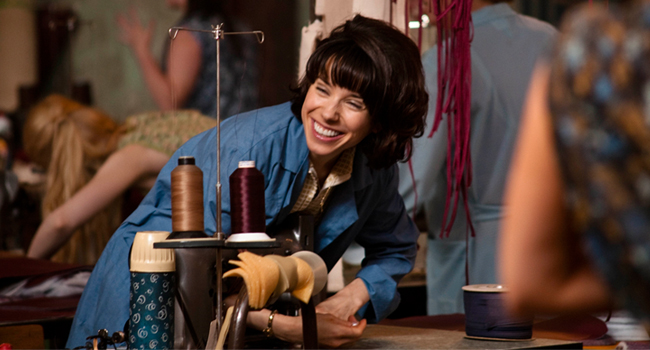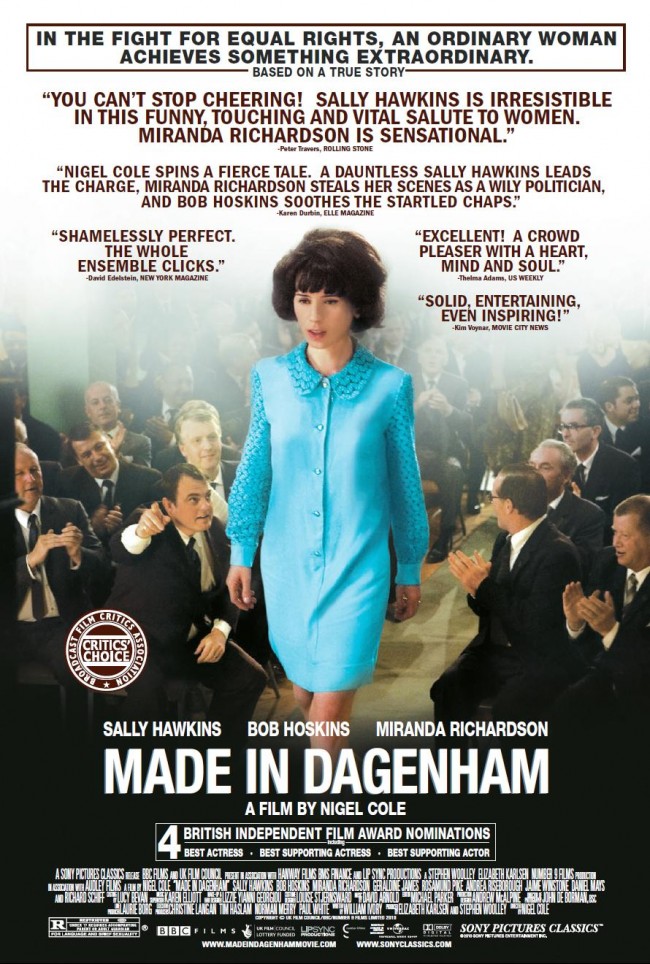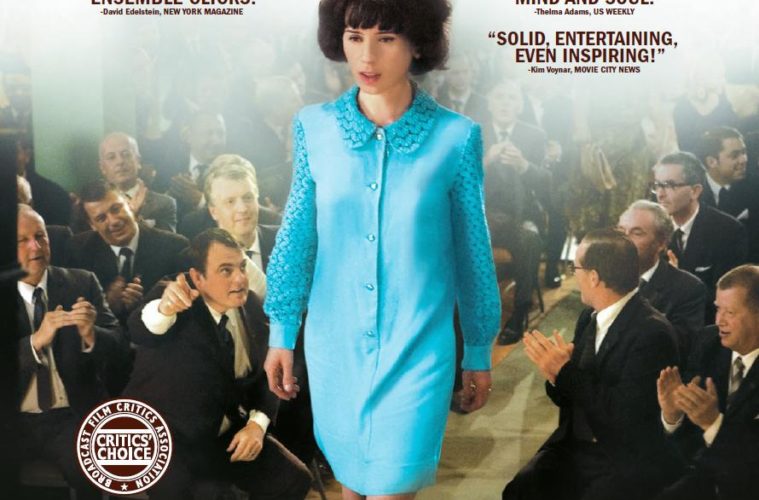
Like Nigel Cole’s past works (Saving Grace and Calendar Girls), Made in Dagenham challenges social taboos with a whimsicality and charm that makes it as thoroughly entertaining as it is thought provoking. Based on real events, Made in Dagenham reveals the struggles a group of sassy blue-collar women faced, and how their strike ultimately led to a tipping point in workplace equality. Set in the factory town of Dagenham, a place that is geographically miles from London but culturally worlds away, the film displays these women as ones without a covert political agenda, asserting the idea that equality transcends politics, as one of the heroines brazenly declares, “It’s common justice!”
Made in Dagenham centers on Rita O’Grady (played winningly by the Happy-Go-Lucky Sally Hawkins), a female machinist at the Ford factory in Dagenham. She and her colleagues sew together the seats for the cars on the line. When an executive order re-grades their jobs as unskilled — giving them the same low wages as the teenaged boys who sweep the factory floors — the women demand the grade of skilled workers and the pay raise attached to that title. When they are nonchalantly rebuffed by upper management, Rita is encouraged by her supervisor and friend Albert (the brilliant and heartbreaking Bob Hoskins) to organize and go on strike. Rita ups the ante from the grade argument to the larger and far more shocking demand – equal pay to their male counterparts! The resulting strike first grabs the nation’s attention and soon draws the eye of the world.
 Now, while docudramas have a dangerous tendency to break off more than they can handle, or oversimplify to the point of irrelevance, Made in Dagenham masterfully avoids these pitfalls by carefully laying out the sketches of these women’s lives and how their battle affects them, before expanding to the further reaches of their strike. The theme of institutionalized sexism is strengthened as the film threads together the tales of women of different classes who are also ignored and patronized because of their sex. Rosamund Pike plays Lisa, an educated housewife who is tired of being thought a fool by her husband. While her role in the piece is small, Pike makes the best of every frame, adding to her already glowing reputation as a tender and talented actress. Also plagued by the thick-headedness of old school sexism is Barbara Castle (portrayed by the stalwart and fierce Miranda Richardson), who is a high ranking official in the Prime Minister’s cabinet but is consistently patronized by her young male assistants. The varying plights of these women underlines that this strike is about more than a pay increase — whether the women of Dagenham realize it or not.
Now, while docudramas have a dangerous tendency to break off more than they can handle, or oversimplify to the point of irrelevance, Made in Dagenham masterfully avoids these pitfalls by carefully laying out the sketches of these women’s lives and how their battle affects them, before expanding to the further reaches of their strike. The theme of institutionalized sexism is strengthened as the film threads together the tales of women of different classes who are also ignored and patronized because of their sex. Rosamund Pike plays Lisa, an educated housewife who is tired of being thought a fool by her husband. While her role in the piece is small, Pike makes the best of every frame, adding to her already glowing reputation as a tender and talented actress. Also plagued by the thick-headedness of old school sexism is Barbara Castle (portrayed by the stalwart and fierce Miranda Richardson), who is a high ranking official in the Prime Minister’s cabinet but is consistently patronized by her young male assistants. The varying plights of these women underlines that this strike is about more than a pay increase — whether the women of Dagenham realize it or not.
In another break from a typical docudramas, Made in Dagenham is full of color, refusing the bleak tones of a standard working class tale. This tellingly reflects the personalities of the piece’s heroines. The women of Ford are introduced toiling in a stifling hot, crumbling work room, but they are cheerful and proud of their work, which makes their appeal to be heard all the more profound. These are not groaning and griping militants; these are diligent working moms, who know work is hard – but demand to be fairly compensated for their efforts. When the Americans storm in and begin talking about the survival of business, and the effects of equal pay on their profit margins, they are rightfully painted as bullies and villains. In a time when employers are using the recession as an excuse to cover all manner of sins against their employees, Made in Dagenham is regretfully relevant, but still an absolute joy to watch. These daring ladies put themselves and their families on the line and ultimately changed more than their own circumstance — they changed the world. It’s an inspiring tale that is passionately told and should attract audiences young and old, female and male.
On a personal note, the film has an R rating because of curse words. Let me assure you, the occasional four letter word in the film should not deter you from taking your teenaged sisters/brothers, cousins, daughters/sons, nieces/nephews, granddaughters/sons, to see this film. Like much of Cole’s work, this is a picture that is intended for a wide audience, and deserves one. Made in Dagenham is a bold crowd pleaser, as chock full of color and charm as it is packed with compelling – and oft heart wrenching – performances from a truly exemplary ensemble cast. This holiday season there’s plenty of award-worthy films vying for audience attention, but few possess the heart that swells within Dagenham. Do yourself a favor and seek it out.

To read Kristy’s interview with Made in Dagenham’s director, Nigel Cole, click here!
Made in Dagenham opens in New York and Los Angeles November 19, 2010. View the trailer here.

